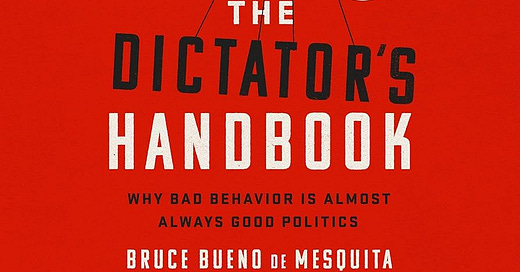March 2025 Book - The Dictator's Handbook
For Trump, dictatorship isn’t a choice—it’s a survival strategy.
Power isn’t about doing the right thing—it’s about staying in control. The first book in the TLM Book Club, The Dictator’s Handbook, lays out why leaders, whether democratic or autocratic, follow the same ruthless playbook: reward your coalition, eliminate threats, and never, ever trust the people.
This is the first in a three-part series of how The Dictator’s Handbook explains Trump’s approach to power. Today, we’ll cover how power works and why dictatorship isn’t a choice—it’s a survival strategy.
In Federalist No. 51, James Madison famously wrote: "If men were angels, no government would be necessary." This is a hopeful acknowledgment that government systems must be built not on trust but on constraint. The Framers of the Constitution understood the dangers of concentrated power and sought to construct a system that, at least in theory, would make it difficult for any one individual to seize control.
But the reality of power doesn’t care about theory. As The Dictator’s Handbook makes clear, leaders don’t act in the public interest because they are good people. They act in ways that maintain their power, and if they don’t, they don’t stay in power for long.
One day in class, a student at George Washington University—earnest, naïve—asked, “Why do people choose to live in dictatorships?”
As if they had a choice.
So, I ran an exercise. I had them count off: 1, 2, 3, 4… 1, 2, 3, 4… until the room was divided into four groups.
Then I turned to the twos, and I pick out one person.
“Congratulations, you won the lottery. You run the country.”
“But don’t get cocky. At any moment, the rest of your group can decide to kill you if they think you’re weak.”
“Your job is to keep power, and to do that, you need to keep the right people happy—starting with yourselves.”
To the rest of “the twos,” I said:
“You are the elites. You have most of the wealth, political power, and businesses.”
“You like running the country and being the power base, but you need this guy,” (pointing to the “King”) “to get things done, so you support him. Unless he doesn’t get things done, in which case, you kill him, and pick someone else amongst you to be the new guy, until he fucks up, then you kill him and try again. Everyone understand?”
Inevitably, everyone understands.
Then I turned to the threes.
“You’re the military. Your job? Beat the hell out of those people (pointing at the ones and fours). You enforce the order.”
“But here’s the catch—you depend on the twos to pay you and give you enough political power to stay loyal. If they screw you over, you can overthrow them. But you don’t know how to run the economy. So, you need them too.”
Then I turned to the ones and fours—the rest of the country.
“You’re the peasants. You work, you suffer, and when you complain, the threes make you disappear.”
“Rape and murder are common. Children are sold into slavery or just killed outright. The international community ‘feels bad,’ but nothing changes.”
“Life sucks. That’s how this works.”
Then I asked, “Who’s happy with their position?”
The twos and threes grinned. The ones and fours? Not so much.
Then I asked, “Who has the power to change things?”
Some of the ones and fours hesitantly raised their hands.
I turned to the threes: “Do you agree to kill them?”
They did. No hesitation. No remorse. They didn’t even blink.
The room fell silent.
By the end of class, they understood why dictatorship isn’t a choice—it’s the natural order of power when constraints don’t exist.
The international system is anarchic. Governments are their own judge in their own cause. These rules work together to create systems of state-led hierarchy that function to do one thing: create a stable system of political power survival. It could be a system that maximizes liberty, thereby creating stability by diffusing power; it could be a system that minimizes the number of power holders, thereby creating simplicity in maintaining power.
That’s why The Dictator’s Handbook argues that no man rules alone. Any leader stays in power by keeping their coalition happy, whether that coalition is a military junta, a democracy, or a collection of billionaire donors. Organizational structures are not inherently good or evil; they’re just varying levels of political complexity tied to culture and values. This made “American exceptionalism” exceptional (at least for a while.)
I’m doing this partly because I agree with Aaron Sorkin that what made America exceptional was that people were informed. Although this speech is dramatized, it has more than a kernel of truth. As education in the United States collapsed, the degree to which the diffusion of America’s “keys” collapsed as well. Scholarly research will probably be done on that observation. (Feel free; I’m out of the game. All yours.)
The American system was designed to resist this dynamic, but as we’ll see, those safeguards only work if the right people enforce them. And right now? Those people are being purged.
Since you’ve read the book (or started to), we won’t rehash what the book says. Instead, we will start talking about what it means and how it applies in today’s world.
Let’s dive in.




